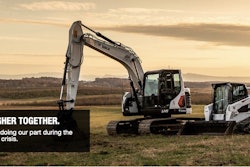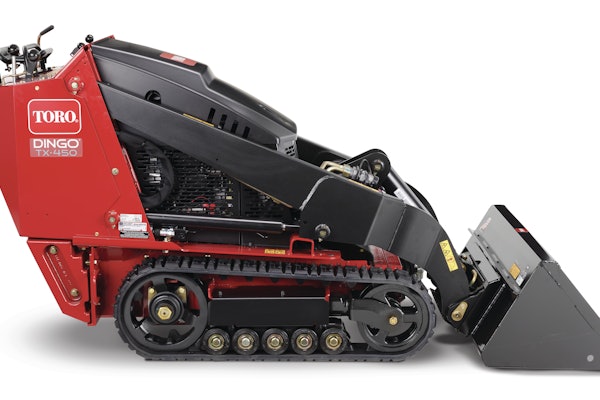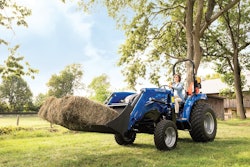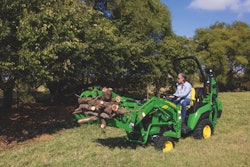 Photo: Createscape Landscaping Service Inc.
Photo: Createscape Landscaping Service Inc.As the days continue to pass, more landscapers are left wondering just how long their shutdown or shelter-in-place orders will last.
For many in the nation, daily operations are still continuing in some shape or fashion, but many landscaping companies are wondering just how much longer can they sustain business under the conditions of the coronavirus (COVID-19).
For Missy Reinholtz, owner of Createscape Landscaping Service Inc. in Mukwonago, Wisconsin, the stay at home orders have been extended until May 26.
Even with this extended order, Reinholtz says all of her employees are still reporting to work every day, and they are still able to go out and get their jobs done.
“We have work, and you’re allowed to work,” says Reinholtz. “If you don’t want to work, I understand if you’re nervous about this, but too many of (our employees) rely on it for their income. I understand arguments about they’re only working because they’re afraid that they’re going to lose everything if they don’t and you should be paying them anyway, but that’s not even possible (for us).”
To help keep her employees safe, Reinholtz says she’s provided them with washable face masks they can wear on the jobsites. She adds that they are also sending crews out with only one person per vehicle, some employees are direct reporting to sites and at the end of the day, all equipment and vehicles are sanitized.
Emily Lenhart Scales, acquisition specialist with Canopy Lawn Care, Inc. in Cary, North Carolina, says the company is still currently able to operate its two branches, and they are equipped with both a field team and a platform team that provides customers with constant service.
“Having (the platform team) as the middleman actually has helped us be able to work more efficiently so that we can communicate with the field team to get the customer’s needs addressed without having to contact the field team directly,” says Scales. “The field team is a little less hands-on with technology, so it’s just easier for us to touch base with them without having a customer be involved in that.”
 Photo: Canopy Lawn Care Inc.
Photo: Canopy Lawn Care Inc.Scales says their platform team was able to transition to remote working at the start of the virus, and the field team is still reporting to jobsites. Scales says the field teams have had to implement new safety guidelines into their everyday work to cope with the virus, such as maintaining proper social distancing on the sites, refraining from knocking on a customer’s door and being more mindful of the customer’s health needs.
“It’s really opened our eyes to how much we have to think about others,” says Scales. “Some of our guys we have limited to one-man crews where we usually would have two men in the same truck.”
Scales adds that they’ve also increased the amount of hand sanitizer and personal protective equipment (PPE) for the field team, and the cleanliness of office vehicles and tools has been ramped up.
“We’ve always been very cautious about having clean equipment,” says Scales. “We have an extremely knowledgeable agronomist that is part of our operations team, so we have always had proper procedures in place for that. Now, we have gloves and more sanitary needs so that if anybody has come into contact with something and maybe touched a piece of equipment, they’re able to just wipe it down and get it out of there.”
Finances, backlog and potential cuts
Reinholtz says Createscape did utilize the Paycheck Protection Program (PPP) but even with this assistance, she doesn’t think it will get them through two more months under these conditions. The only thing that will even marginally get them through this pandemic is working, she says.
With how quickly information regarding the virus changes, Reinholtz says it can be a struggle sometimes to make sure she is updated on the most recent information, along with making sure she is able to relay that information to her employees.
 Photo: Createscape Landscaping Service Inc.
Photo: Createscape Landscaping Service Inc.“I’m really trying to get employees to understand this is for their safety,” says Reinholtz. “When I say you can’t be within six feet of one another, I don’t want you within six feet of one another. And it’s not necessarily because I’m afraid they’re going to make each other sick, but it’s because public perception is going to kill our industry. People can take pictures and say look, these landscapers weren’t socially distant.”
Reinholtz says she has already lost two of her biggest annual spring cleanup jobs due to her customers no longer having the funds to support the work being done.
“I think the problem is we’re never going to know how this is hurting us from a project standpoint because we don’t know the number of people that are afraid of spending money,” says Reinholtz.
Even though there have been a few project cancellations, Reinholtz says the company has still been able to make their materials deliveries to customers. With the number of excess products they have, Reinholtz says they are able to sell the excess to customers who are wanting to do their own yard work during the quarantine.
 Photo: Createscape Landscaping Service Inc.
Photo: Createscape Landscaping Service Inc.Createscape also screens topsoil, and Reinholtz says they currently have about 30,000 yards of it that they can supply to customers and other landscapers in the area, as well as use on their own jobsites.
So far, Reinholtz says they have not had to make any staffing cuts, but she does admit that it’s hard to know what they will have to do if the situation doesn’t change soon.
“I’m fearful that in the coming weeks if I continue to have clients canceling projects that cuts might be coming, but I don’t, hopefully, foresee that because I do have a ton of quotes to do on my desk,” says Reinholtz.
Currently, Scales says they have not had to make any financial or staffing cuts and they don’t foresee having to, but depending on the longevity of the virus, that could change in the coming months. Scales says their sales team has taken a substantial hit in meeting their sales goals, as this time of year is usually booming for them.
Check back tomorrow for part two, where we’ll hear more about how these companies are keeping in touch with their customers, as well as what they think the next few months will bring.










